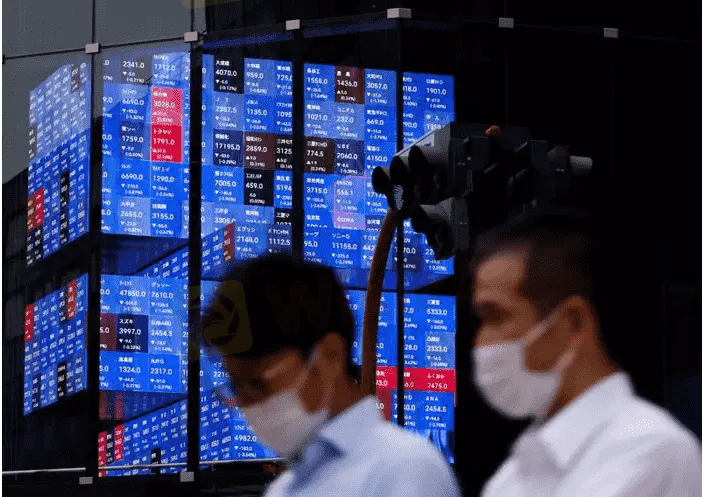简体中文
繁體中文
English
Pусский
日本語
ภาษาไทย
Tiếng Việt
Bahasa Indonesia
Español
हिन्दी
Filippiiniläinen
Français
Deutsch
Português
Türkçe
한국어
العربية
Asia shares edge up with Wall St futures, mood fragile
Abstract:Asian shares were trying to sustain a rare rally on Monday as Wall Street futures made early gains, perhaps hoping a U.S. holiday would provide a break from recent selling, though worries about global recession were never far away.

The euro softened slightly after French President Emmanuel Macron lost control of the National Assembly in legislative elections on Sunday, a major setback that could throw the country into political paralysis.
Nasdaq futures made the early running with a rise of 1.0%, while S&P 500 futures bounced 0.6%. Recently, both have had a habit of gaining in Asia only to turn tail once London and New York open.
The S&P 500 fell by almost 6% last week to trade 24% below its January high. Analysts at BofA noted this was the 20th bear market in the past 140 years and the average peak to trough bear decline was 37.3%.
Investors will be hoping it does not match the average duration of 289 days, given it would not end until October 2022.
MSCI‘s broadest index of Asia-Pacific shares outside Japan edged up 0.1% in thin trade. Tokyo’s Nikkei added 0.6%, having been underpinned recently by a sharp fall in the yen which boosted exporters.
Aiding sentiment was news President Joe Biden was considering removing some tariffs on China and a possible pause on federal gas tax to fight inflation.
Yet, looming over markets are concerns major central banks will have to tighten so aggressively to contain runaway inflation that they will tip the world into recession.
“Market volatility has remained elevated with the VIX index seeing the highest weekly close since late April, a theme that goes beyond equities with a spike in FX and rates volatility alongside wider credit spreads,” said Rodrigo Catril, a strategist at NAB.
“At this stage it is hard to see a turn in fortunes until we see evidence of a material ease in inflationary pressures.”
Relief seems unlikely this week with U.K. inflation figures expected to show another alarmingly high reading that could push the Bank of England into hiking at a faster pace.
A whole chorus line of central bankers are also on the speaking calendar this week, led by a likely hawkish testimony from Federal Reserve Chair Jerome Powells to the House on Wednesday and Thursday.
The Fed last week vowed its commitment to containing inflation was “unconditional”, while Fed Governor Christopher Waller on Saturday said he would support another hike of 75 basis points in July.
That hawkish promise is keeping the dollar up at 104.680 and near last weeks two-decade high of 105.790.
The euro was a fraction lower after the French election at $1.0488, still uncomfortably close to last weeks trough at $1.0357.
The yen remained under broad pressure as the Bank of Japan stuck doggedly to its super-easy policies even as all its developed world peers took steps to tighten. The dollar was firm at 135.36 yen having reached its highest since 1998 last week.
The strength in the dollar has kept gold in a tight sideways pattern for the past month or so and it was last stuck at $1,838 an ounce. [GOL/]
Oil prices edged up early Monday after a sharp retreat late last week amid concerns high energy prices were adding to risks of a global recession which would ultimately curb demand. [O/R]
Brent firmed 69 cents to $113.81, while .U.S. crude added 80 cents to $110.36 per barrel.

Disclaimer:
The views in this article only represent the author's personal views, and do not constitute investment advice on this platform. This platform does not guarantee the accuracy, completeness and timeliness of the information in the article, and will not be liable for any loss caused by the use of or reliance on the information in the article.
Read more

5 Overlooked Details That Could Make or Break Your Trades
Trading requires more than just a solid strategy. Success often depends on paying attention to small details. These details may seem unimportant but can have a big impact. Many traders ignore them, only to realise their importance later.

Forex Trends: What the Chinese Zodiac Says About the Lunar New Year Market Movements
The Lunar New Year, a celebration rich with tradition, culture, and symbolism, marks the beginning of a new year in the Chinese calendar. Beyond the vibrant parades and festivities, the occasion holds significant meaning in various sectors, including the financial markets.

Can You Really Trust Offshore Brokers?
Offshore brokers have become a popular choice for traders around the world. They often promise low fees, high leverage, and access to global markets. Many traders see these benefits and decide to open accounts. But the big question remains: Can offshore brokers be trusted?

What’s Driving Malaysia’s Inflation in 2025?
Inflation in Malaysia is projected to rise to as much as 2.8% in 2025, driven by domestic policy adjustments, wage increases, and external market fluctuations.
WikiFX Broker
Latest News
NBI Busts Crypto and Phishing Scam Operation in Parañaque City
Doo Prime Officially Launches Trading for OFFICIAL TRUMP (TRUMP/UST)
Acuity Trading Integrates Its Cutting-Edge Tools with cTrader to Revolutionize Trading Experiences
Phemex Hacked: $37 Million Loss Raises Crypto Security Concerns
Khazanah Nasional Bets on Developed Markets Amid Global Shifts
Trump Urges OPEC to Lower Oil Prices
British Museum hit by alleged IT attack by ex-worker
Japan May Face Significant Interest Rate Hikes
Philippines Launches 10-Year & 25-Year USD Global Bonds
Binance Kicks Off 'It's Still Early for Crypto' Campaign
Currency Calculator






